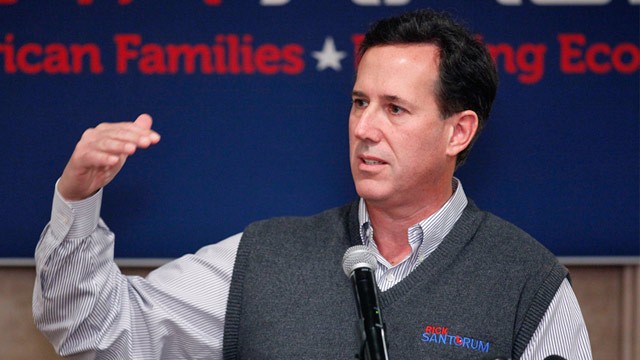Last week, conservative columnist Mona Charon editorialized that although Rich Santorum has done some laudable things in his career, such as defending the unborn and the sanctity of marriage, being a leader on welfare reform, and warning the public about the danger of a nuclear- armed Iran, he still would make a “poor Republican nominee.”
Why? Well, for one, his outspoken views on social issues makes him the “sort of candidate who will evoke a Pavlovian response from the press. Just as they were driven mad by Sarah Palin, they will be outraged by Rick Santorum . . . and precious time will be lost as he explains, justifies, or withdraws his comments on women in the workforce, contraception, gay unions . . . and so forth.”
So, if I read Ms. Charon correctly, her fear is that the press will have a field day going after Santorum and his politically charged statements. But wontʼ they do the same thing to whoever gets the Republican nomination? Will Romney escape the inevitable barrage of verbal assaults that the press will unleash upon him? Will not his wealth (obviously a one-percenter), his record at “predatory” Bane Capital, his enjoyment at “firing people,” and the fact that he is not “concerned about the poor” be fodder for the mainstream press? Who knows how many women will come forward and claim some kind of illicit sexual relationship with him? Whether they are telling the truth or not will be irrelevant. And one should not assume that Romneyʼs Mormon faith will somehow be off-limits. When push comes to shove, Romney will be painted as a weird cultist.
Ms. Charon focuses most of her criticism of Santorum from his 2008 speech before a Catholic audience. She characterizes his style as “sanctimonious” and one that would probably be disturbing to even religious voters. She writes, “His intense 2008 warning about ʻthe Father of Lies, Satanʼ having his ʻsights on the United States of America . . . attacking the great institutions of America–using those great vices of pride, vanity and sensuality as the root to attack all of the strong plants that [have] so deeply rooted in the American traditionʼ is not the sort of language most preachers, to say nothing of political figures, employ today.”
Gee, thereʼs a lot to digest here. Where should I start? Letʼs go with her choice of the word sanctimonious, which, of course, means to be “self- righteous.” I wonder if Ms. Charon listened to his entire speech. For in it, he was very critical of his own behavior and attitude, particularly in his youth and his indifference to abortion. He condemned himself for his pride and ignorance. Sanctimonious? I think not.
As for Santorumʼs reference to Satan, is it farfetched for a devout Christian to believe that Satan exists and that he is a “ravenous wolf seeking out whom he may destroy”? Is it beyond the pale to believe that Satan would, in fact, want to destroy a nation? And is it strange to profess that Satan uses pride, vanity, sensuality, and other vices to corrupt the morals of a people? There are two key questions here that must be addressed. First, is Satan real? If not, then Santorum is worse than sanctimonious; heʼs crazy. If Satan is real, then what is his purpose on earth? The Catechism of the Catholic Church declares that, because of his hatred for God, Satanʼs purpose is to destroy souls and thus prevent them from enjoying eternal bliss with God. The Church clearly regards Satan as a threat to souls. In Ephesians, Paul wrote, “. . . be strong in the Lord and in the strength of his might. Put on the whole armor of God, that you may be able to stand against the wiles of the devil. For we are not contending against flesh and blood, but against the principalities, against the powers, against the world rulers of this present darkness, against the spiritual hosts of wickedness in the heavenly places.” Obviously, Paul saw Satan as a serious threat to mankind. And if Satan is not a threat, then what was the purpose of Christʼs sacrifice on the cross? Was it to save us from trans fats?
Finally, while still referring to the 2008 speech, Charon writes, “American religion these days is heavy on forgiveness and light on sin. Weʼve long since left Jonathan Edwards behind. Anything other than comic references to Satan are likely to give people the creeps.” All that Charon proves here is that the modern Christian church has abandoned its belief in Satan, sin, and eternal judgment. And because it has, many of our cultural problems exist today. This is why Santorum has made the connection between illegitimacy, the concomitant breakdown of the family, moral corruption, and the economic crisis we are currently experiencing. Now we should keep in mind that Santorum did not enter the presidential sweepstakes by promoting only contraception and lecturing the country on its use. He has serious programs to create jobs, reduce spending, strengthen the military, and restore American greatness. It was the mainstream press that jumped on the 2008 speech in order to paint Santorum as a religious fanatic. Sadly, Ms. Charon has joined the chorus.
Mona Charonʼs last paragraph is not only a disservice to Santorum but also to herself. She writes, “American are open to be persuaded that the federal behemoth can be tamed, that our health-care system can be saved before it buries us in red tape and incompetence, and that entitlements can be sensibly reformed. But they wouldnʼt even hear these arguments from Rick Santorum. Heʼd be too busy putting Satan behind him.”
Really, Mona? Really? You had to throw one last zinger to make sure the reader understood that Santorum is a religious fanatic? And who was it in Scripture that said, “Get thee behind me, Satan,”? Oh, yes, that other fanatic.








